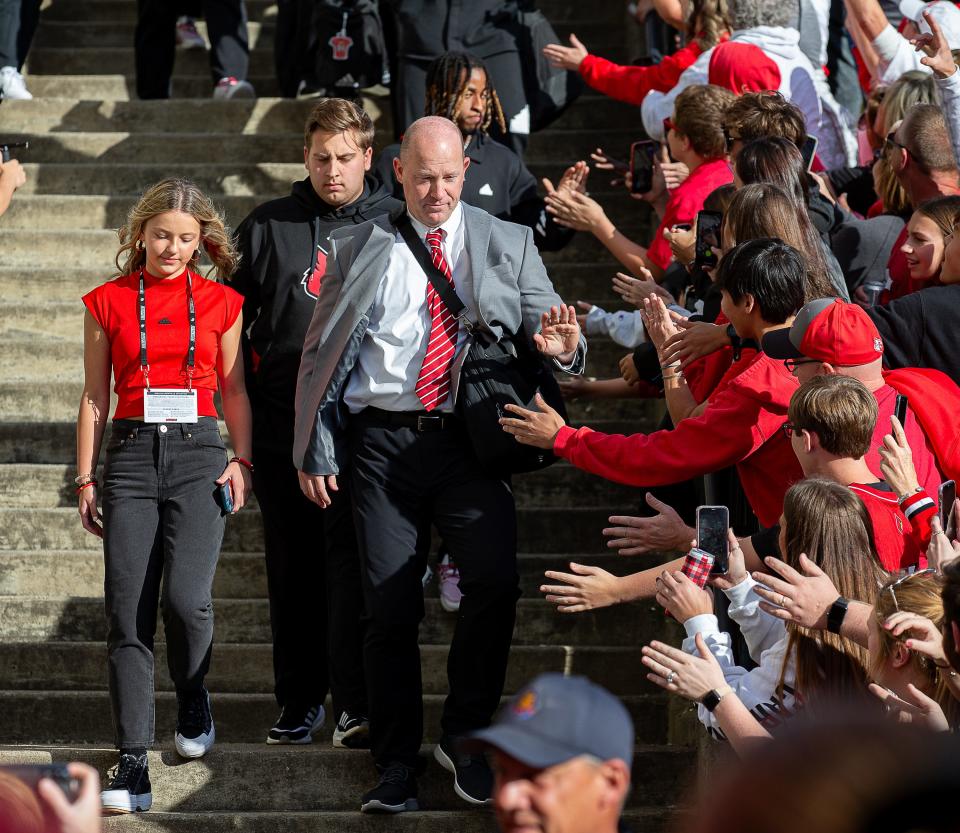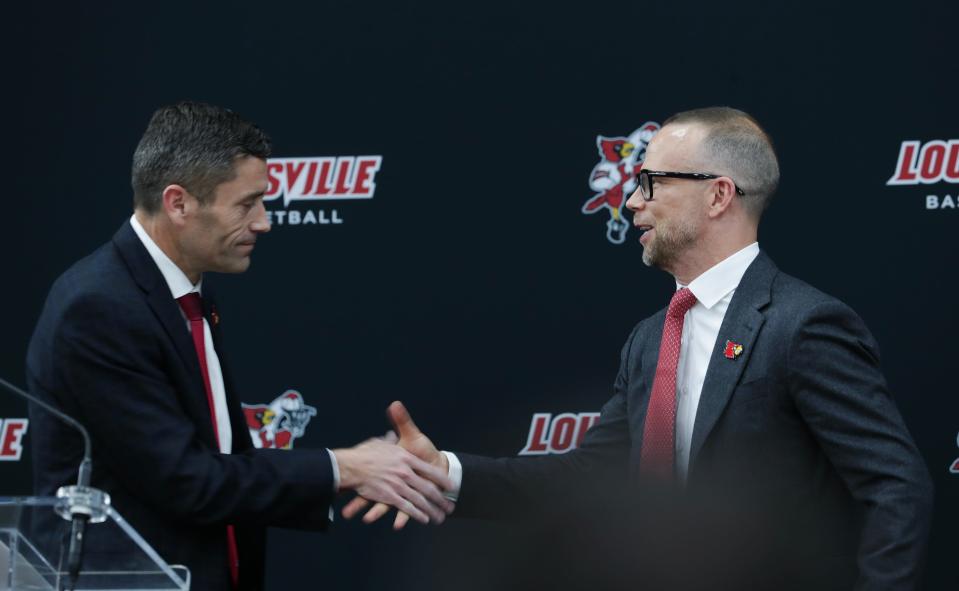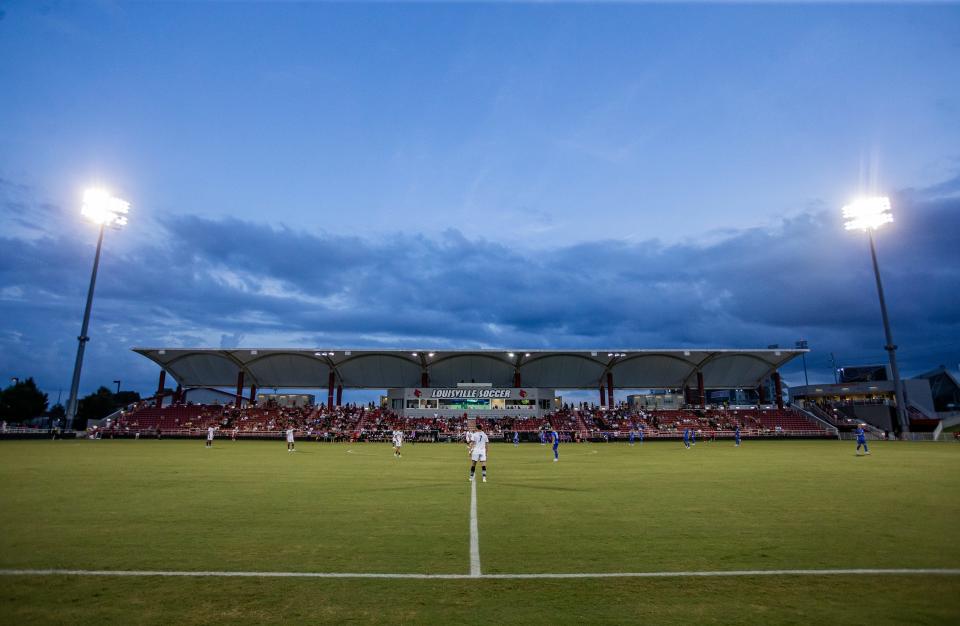Louisville Athletics sets 2024-25 budget, preparing for NCAA's future of paying players
The University of Louisville Athletic Association (ULAA) on Friday approved a $145,031,274 budget for the 2025 fiscal year, roughly $4.8 million less than its FY2024 projected revenue and expenses.
Athletics director Josh Heird said it's a financial plan his department can "live within" while keeping one eye toward the seismic changes to college sports that are on the horizon; regarding which there are many questions but few concrete answers.
Those changes stem from the NCAA and its Power Five conferences in late May agreeing to the proposed settlement of three antitrust cases concerning the compensation of college athletes.
The settlement, which has not yet been approved by a judge and whose Title IX implications are unclear, paves the way for schools to begin sharing revenue directly with athletes as soon as fall 2025; green-lights nearly $2.8 billion in back damages over the 10-year agreement to those who weren't allowed to profit off their name, image and likeness (NIL) when they played; and is expected to remove scholarship restrictions while limiting roster sizes.
Schools won't be required to directly compensate athletes; although those that don't will undoubtedly be at a competitive disadvantage.
The expectation is for athletics departments paying the maximum combined total under a to-be-determined cap to face an additional expense of nearly $20 million per year — 22% of an average Power Five school's revenue — while receiving between $1 million to $2 million less funding from the NCAA annually to account for back damage payments.

Amid the uncertainty, Heird knows this much: "We're not just going to cut our way to $20 million."
Some attrition is to be expected, though. In fact, it's already started. For example, when sports information director Zach Greenwell left last month to take a job at LSU, Heird opted to leave his position unfilled.
To avoid layoffs and axing nonrevenue sports — most of which, Heird said, are operating on "lean" budgets to begin with — nothing's off the table in the department's hunt for additional funds to compensate athletes when the time comes.
Here are three steps that were discussed during Friday's ULAA meeting:
Raising Louisville football season ticket prices in 2025

Jeff Brohm worked wonders during his first season as Louisville's head football coach, and expectations are high for the Cardinals in Year 2.
But a portion of Friday's meeting was dedicated to looking even further ahead. The board approved new, more expensive season ticket prices at L&N Stadium for the 2025 campaign; including a $130 per ticket, per game increase for premium seating and increases ranging from $15 to $45 in the lower bowl.
Several factors explain the decision to do so.
For starters, football is the top revenue-driver of seemingly every Power Five program; and at U of L it generated $26.2 million during FY24. The athletics department raked in $2 million apiece from two sellouts, the Cards' win against Notre Dame and their loss to archrival Kentucky.
There's one fewer home game on the schedule this season, however, and no "premium" visiting opponent after Indiana backed out last fall of its trip to the 502 and was replaced with Jacksonville State. So the goals for FY25 are relatively modest — a 10% increase in season tickets sold (to 40,000), one sellout — leading to $24.4 million in projected revenue.
The adjusted prices for the 2025 season, which will feature eight home games and two "premium" matchups, against Clemson and UK, are expected to generate a 12%-plus increase in season ticket and donation revenue.
Getting Louisville men's basketball back on track

Simply put: Louisville cannot afford another men's basketball season of sparse crowds at the KFC Yum! Center after falling $1.9 million short of its ticket sales goal for FY24.
Former head coach Kenny Payne is on the books for $7,250,000 — doled out in monthly installments of $201,388.88 until 2027 — and it cost $1.1 million to get his successor, Pat Kelsey, out of his contract at Charleston.
Kelsey, during his short time on the job, has injected new life into a program that went 12-52 under Payne's guidance and averaged 11,986 tickets sold per game (6,504 scanned) at the 22,090-seat Yum! Center. Between Kelsey's formal introduction March 28 and April 12, the athletics department had sold more than 670 new season tickets; which put it in position to dwarf sales entering Year 1 of Payne's tenure.
In steering the program back toward its former status as one of the sport's most profitable in the country, the athletics department is hoping for a 30% increase in season ticket sales (to 12,000) and two "premium" games at 90% capacity — one nonconference and one during ACC play.
The proposed FY25 men's basketball revenue, $25.8 million, is up from $23.9 million in FY24.
"There's some presumptions there that basketball is going to do better than it's done the last couple of years," Heird said. "As I say, 'If you're not going to be an optimist in this job, then why are you doing this job?'"
If Kelsey gets things rolling at the Yum! Center again, Heird's job will get much easier. Per Forbes, the men's basketball program averaged annual revenues of $52 million and profits of $30 million between the 2014-15 season and the 2016-17 campaign.
Spending to lessen the financial burden

There's a way U of L can turn $20 million per year toward compensating athletes into $15 million, Heird said.
Step 1 is increasing the department's funding of Alston awards — annual stipends of up to $5,980 for academic achievement — from roughly $1.7 million to $2.5 million per year.
Step 2 is increasing its scholarship costs by $2.5 million. That shouldn't be too hard considering it will be able to offer scholarships to every member of its teams, within the roster size limits, under the proposed settlement.
Those limits have not yet been determined, though. And, again, we don't know how Title IX will factor into the equation.
Heird said there's been a lot of conversation among ACC leaders about football. A popular roster number being thrown around nationally is 85, which would eliminate walk-ons. In terms of men's and women's basketball, he said he doesn't foresee teams' roster sizes changing much from 13 and 15, respectively.
"You get some of these equivalency sports, where they've been giving up half-scholarships and quarter-scholarships to try to fill out a 30-, 40-, sometimes 50-person roster over 12 scholarships; what are those numbers going to look like?" Heird said. "I think that's where those conversations are going to be had."
Reach Louisville men's basketball reporter Brooks Holton at bholton@gannett.com and follow him on X at @brooksHolton.
This article originally appeared on Louisville Courier Journal: Louisville Athletics sets FY2025 budget, prepares for uncertain future